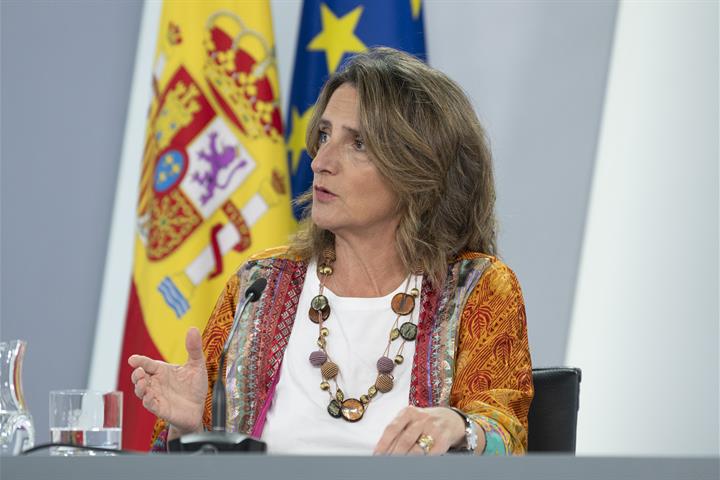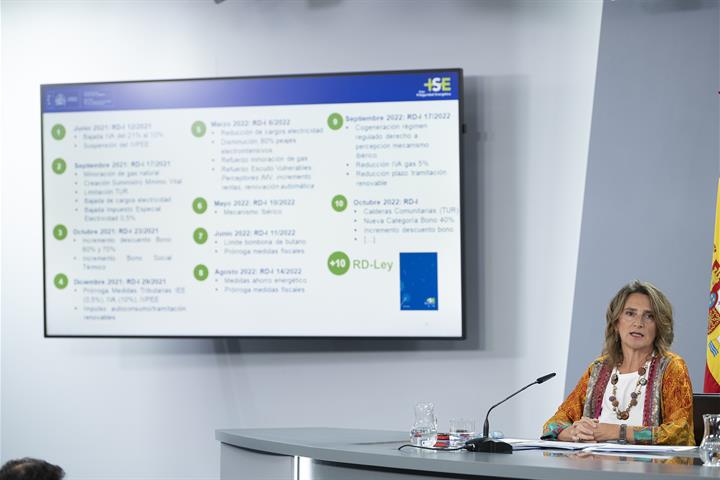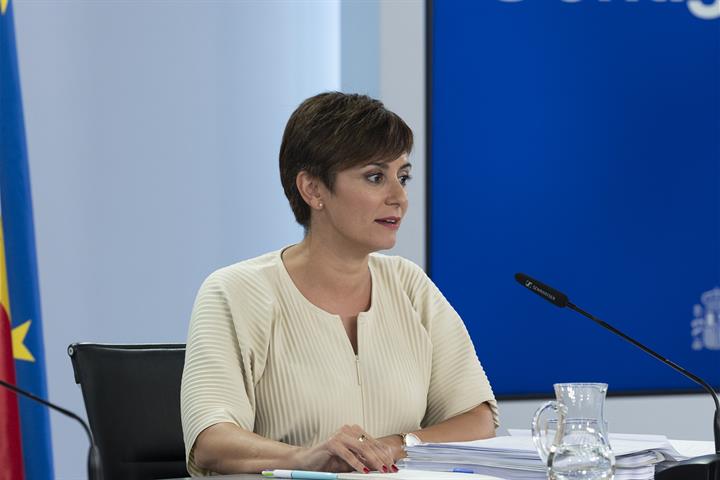Council of Ministers
The Government of Spain extends the regulated gas heating tariffs to all households and extends the electricity bonus
Council of Ministers - 2022.10.18
Moncloa Palace, Madrid
The Council of Ministers has approved a Royal Decree-Law that strengthens consumer protection vis-à vis the energy crisis caused by the war in Ukraine and implements 18 of the 73 measures of the Energy Security Plan, presented last week.
The Minister for Territorial Policy and Government Spokesperson, Isabel Rodríguez, stressed that at this time of international uncertainty, the government is focused on protecting families, the self-employed and businesses, as it did when faced with the consequences of the COVID-19 pandemic. The initiatives launched today will mobilise close to €3 billion and mean that 4 out of 10 households will then be benefiting from the Executive's coverage in this area.
Rodríguez also underlined that this Decree-Law is consistent with the energy transition policy initiated four years ago, which benefits all citizens, caters for the social majority and does not overlook the most vulnerable people. "These are far-reaching reforms" that offer "both protection and a fair distribution of burdens", she summarised.
Protection, transition and efficiency
The Third Vice-President of the Government of Spain and Minister for Ecological Transition and the Demographic Challenge, Teresa Ribera, has stated that, from the outset, the government has not only prioritised the transformation of the energy system, but has approached the process by protecting the entire population and the productive fabric, and by anticipating the European response.
 Third Vice-President of the Government of Spain and Minister for Ecological Transition and the Demographic Challenge, Teresa Ribera, during her speech at the press conference after the Council of Ministers | Pool Moncloa / Borja Puig de la Bellacasa
Third Vice-President of the Government of Spain and Minister for Ecological Transition and the Demographic Challenge, Teresa Ribera, during her speech at the press conference after the Council of Ministers | Pool Moncloa / Borja Puig de la Bellacasa
Ribera pointed out that this decree-law is the tenth on this matter since June 2021 and that all the work involved has succeeded in promoting renewable energies and self-consumption, contributing to reducing electricity consumption and reducing electricity bills by around 33% (compared to what would be paid without these measures). "But this is not enough. We obviously have to alleviate the cost of energy for all consumers, with a focus on the most vulnerable, and we must think not only about how to extend the coverage of the most vulnerable, but also how to increase the protection of the middle classes," she argued.
The measures promoted today - 29 out of the total of 73 included in the More Energy Security Plan - are grouped into three blocks: consumer protection, energy transition and the promotion of energy saving and efficiency, with the aim of "contributing to this collective effort in a fair, inclusive and balanced way".
Community boilers and the electricity bonus
To increase consumer protection, the text creates a new tariff that will benefit those who have a heating system based on a boiler owned by the community of homeowners, extending the advantages of last resort gas tariffs for small consumers, be they SMEs or families; extending the thermal social bonus; strengthening the electricity social bonus; and making industrial contracts more flexible and bills more transparent.
The third vice-president detailed that the special tariff for community boilers will initially be in force until 31 December 2023 and will benefit approximately 1.7 million families, who must have individualised metering systems installed by the end of September 2023 and their boilers checked to ensure that they are operating as efficiently as possible. If homeowners' associations stay at around the average consumption of recent years, the sum of the tax reduction on fixed costs and the new special tariff will result in savings of around 50%.
 Third Vice-President of the Government of Spain and Minister for Ecological Transition and the Demographic Challenge, Teresa Ribera, during her speech at the press conference after the Council of Ministers | Pool Moncloa / Borja Puig de la Bellacasa
Third Vice-President of the Government of Spain and Minister for Ecological Transition and the Demographic Challenge, Teresa Ribera, during her speech at the press conference after the Council of Ministers | Pool Moncloa / Borja Puig de la Bellacasa
As for electricity bills, a new tariff, also of a temporary nature, will benefit the middle and working classes. Teresa Ribera explained that families with an income of up to €28,000 and several members living in the same household will be able to enjoy a special discount of up to 40% of the electricity they consume.
In addition, the coverage of the electricity social bonus is increased to a 65% and an 80% discount for the vulnerable and severely vulnerable, respectively, while the aid for the thermal social bonus is also increased.
Promoting self-consumption and savings
To accelerate the energy transition, the Decree-Law includes additional provisions on self-consumption and renewable gases, with more flexible regulation on access to electricity grids and simplification of the administrative processes involved.
In the area of savings and efficiency, Ribera spoke about the extended tax deductions for investments in the context of housing refurbishment; the freedom from depreciation for companies that invest in capital goods that reduce energy bills; the increase in efficiency requirements for public lighting projects that begin after 1 January next; and the commitment to smart natural gas meters in households, with a budget item earmarked for this purpose.
€711 million for Ceuta and Melilla
 The Government Spokesperson and Minister for Territorial Policy, Isabel Rodríguez, during her speech at the press conference after the Council of Ministers | Pool Moncloa / Borja Puig de la Bellacasa
The Government Spokesperson and Minister for Territorial Policy, Isabel Rodríguez, during her speech at the press conference after the Council of Ministers | Pool Moncloa / Borja Puig de la Bellacasa
The Chief Executive has approved the Comprehensive Socioeconomic Development Plans for Ceuta and Melilla, with an investment of €711 million between 2023 and 2026. Over 75% of the funding comes from the General State Budget and the European Union Structural Funds, and the rest from the Recovery, Transformation and Resilience Plan (PRTR).
The plans contain more than 140 measures grouped around the development of a new economic model, the promotion of infrastructure and housing, and the strengthening of public services.
The Minister for Territorial Policy stressed that this is an "unprecedented" investment, the outcome of the President of the Government of Spain's commitment to the two autonomous cities and the work of the entire Executive. Seventeen ministries were involved in drafting the documents, in addition to local administrations and social partners.
Inclusive education and recognition of diplomas
The Council of Ministers has approved the distribution to the regions of €38 million to attend to students with specific educational support needs in pre-school and the first two cycles of primary education. The government spokeswoman said that her goal is "to ensure that all children with special needs have the educational support they deserve".
In the field of higher education, the Chief Executive has streamlined the procedure for applications for the recognition and equivalence of foreign degrees, which will promote talent in our country and also make Spain "attractive to talent in other parts of the world".
Other agreements of the Council of Ministers
 The Government Spokesperson and Minister for Territorial Policy, Isabel Rodríguez, and the Third Vice-President of the Government of Spain and Minister for Ecological Transition and the Demographic Challenge, Teresa Ribera, appear before the media | Pool Moncloa / Borja Puig de la Bellacasa
The Government Spokesperson and Minister for Territorial Policy, Isabel Rodríguez, and the Third Vice-President of the Government of Spain and Minister for Ecological Transition and the Demographic Challenge, Teresa Ribera, appear before the media | Pool Moncloa / Borja Puig de la Bellacasa
The government has authorised an agreement with the Instituto de Crédito Oficial (ICO) to create a new line of guarantees for housing rehabilitation, worth €1.1 billion. They will cover up to 50% of the works, bringing the total investment in the sector to €2.2 billion. Isabel Rodríguez recalled that the commitment is to inject more than €3.4 billion into housing renovation by 2026, especially with the aim of improving energy efficiency.
Last, the Chief Executive has authorised the construction of a new section of the Palencia-Santander high-speed railway line, with an investment of more than €88 million.
Non official translation




